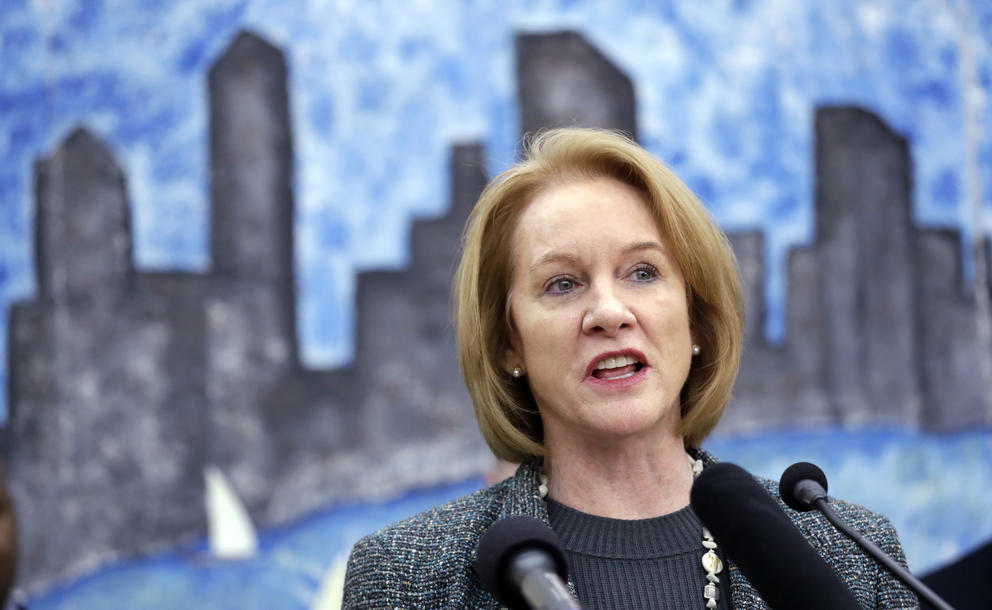Seattle is divided by class. The tech companies of South Lake Union bring wealth that seeps into the housing market, but not necessarily into the pockets of people who need housing. Jobs seem to spawn more jobs, but access to them still eludes many who grew up here. And as Seattle pools outward to the suburbs, means of transportation are lacking.
These problems are not new; Durkan did not create them. But as she became the first woman to deliver the State of the City address (Bertha Knight Landes, Seattle’s only other female mayor, apparently never gave one), the energy of her speech and the positive feedback of the audience were undercut by reality: the city’s problems are now her problems.
“These crises are years in the making, but will not be fixed over night,” she told the packed auditorium. “There will be times when we take two steps forward and one step back. I know there will be times when you’ll be frustrated with City Hall and with me.” But, she pledged, blurring the class lines would be her most singular focus so long as she’s in office.
As for promises, Durkan had a few. The most significant of those was her announcement that the city would provide free ORCA cards to all public high-school students in Seattle. “Right now, for too many students in Rainier Beach and on Lake City Way and other parts of our City, getting to school or work means an unsafe trip or a long walk in the cold and rain,” she said. “This is wrong. Here’s what is right: that each student in Seattle has access to affordable, reliable transportation.”
The move to make ORCA cards free — for use on King County Metro, King County Water Taxi, Seattle Streetcar, Sound Transit, Community Transit, Pierce Transit, Kitsap Transit and Everett Transit — began months ago with rallies at Rainier Beach High School, the site of Durkan’s speech. It became a campaign issue first for mayoral candidate Nikkita Oliver in the primary, then Cary Moon and Durkan in the general election.
Durkan’s goal is to get the cards into the hands of all 15,000 students by fall, for an estimated $4.8 million for the first year — $3.8 million in onetime spending from the Department of Transportation and $1 million from the county. To fund the program into the future, Durkan will need to work with the City Council to find the money.
Durkan also had several promises that came without specifics. For one, she said, she would work with Councilmember Teresa Mosqueda to create a “domestic workers bill of rights.” This was a campaign issue as well, one both she and Moon favored. Following the lead of New York State, such a bill would guarantee domestic workers like nannies and housekeepers be paid proper minimum wage and overtime.
Additionally, Durkan said she would shortly introduce legislation to clear the path for more environmentally friendly buildings.
And, she said, she would champion stronger gun laws, a difficult task from the city-level. Other than praising the Seattle Police Department for removing guns, she didn’t say exactly what she would do as mayor.
Durkan took her time with the speech, which ran nearly an hour. As she spoke, audience members occasionally whooped or gave her a “right on.” As the speech continued, Durkan seemed to settle in and even have fun, interacting at time with the audience.
She got huge applause for her pledges to provide two years of free community college to graduates from Seattle Public Schools, a proposal she unveiled last November, shortly after her election. She name checked communities of color and immigrant communities. “We’ve got to make sure every kid in Seattle Public Schools has the opportunity to go to college for free,” she said.
In some ways, the biggest responsibility of the mayor is as an administrator of government functions. Some of those have not been functioning as well as they should and a wave of harassment and discrimination allegations have bubbled up from city employees. Durkan said the city would do better. "We have to work smarter and we have to work quicker,” she said, adding, “To our city employees, I know we need to give you a safe place to work, free of discrimination and harassment."
In a largely predictable speech, there was one surprise: Durkan warned her department heads to tighten their belts, despite the booming economy. Her fear, one shared by past mayors, is that a recession could be around the corner. “I will be asking all city departments to recognize we have to live within our means,” she said.
Of course, the most pressing crisis facing the city is the lack of affordable housing and the ballooning homeless population. Durkan agreed it’s a “A crisis that threatens the soul of our city,” and pointed to a recent $100 million infusion into new housing. “We have to build more low-income and middle-class housing as quickly as we can,” she said.
But her speech did not contain any new, sweeping solutions to the dual crises, only promises to do better. “But no matter how daunting our challenges, what I can promise you is that as Mayor I will push three things to meet this challenge: Number one, we have to build more low-income and middle-class housing as quickly as we can; Two, we have to quickly provide more short term options that are safe, humane and that actually move people to long term housing; Three, we must create true economic opportunity for everyone. We cannot build a city for the future if it starts with the presumption that so many people have to stay poor.”


